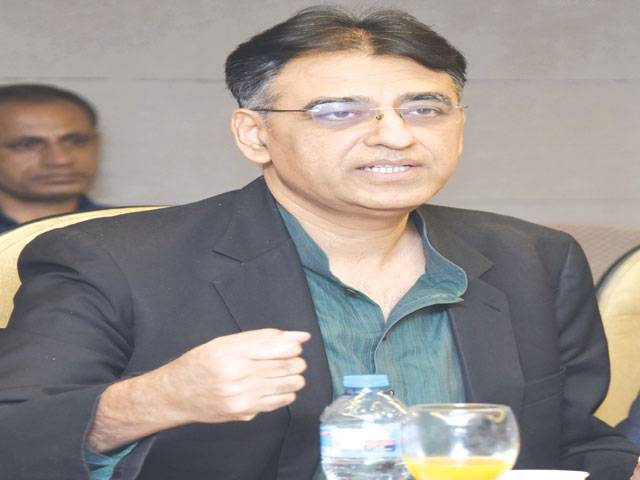ISLAMABAD - Following massive currency depreciation and failure in talks with International Monetary Fund, Finance Minister Asad Umar is under increasing pressure as questions about his competence and handling of the country’s economic matters have been raised by both the ruling and opposition political parties.
Officials deny that Umar is being asked to resign but his position looks increasingly tenuous unless he dispels the impression of being at a loss to take control of the fledgling attempts of the government for an economic turnaround.
The country's social media was abuzz on Monday that Finance Minister had offered his resignation after Jahangir Khan Tareen (former Secretary General PTI) expressed dissatisfaction over performance of Asad Umar in the presence of Prime Minister Imran Khan. Similarly, according to the speculations, Adviser to Prime Minister on Commerce and Textile Abdul Razak Dawood also criticised Umar for allowing rupee depreciation.
However, spokesperson for Finance Ministry said that Federal Finance Minister Asad Umar had neither resigned nor intended to do so. The spokesperson said that different views and perceptions were a sign of a healthy and pluralistic environment, adding that some vested interest were spreading rumours in this regard just for the sake of their nefarious designs.
Later, Jehangir Tareen also stated: “I did not have any altercation with Umar on any matter.”
This is for the second time since October when rumours did rounds on media that PTI’s top leadership was unhappy with the performance of the Finance Minister. Earlier in October, it was reported in media that prime minister was unhappy with the Finance Minister when the PTI-led coalition government had decided to approach IMF for a bailout package. Later, the Special Assistant to Prime Minister on Media Iftikhar Durrani had dismissed the news calling it ‘fabricated’ and ‘baseless.’
In the current situation, the PTI’s economic wizard is under pressure after US dollar touched the all-time high of Rs144 on Friday. On the next working day, the KSE-100 index plummeted 1,400 points in intraday trading as Pakistan Stock Exchange opened on Monday. Trading began at 40,496 points and dropped to 39,177 points within an hour - a change of 1,319 points - before further diving to 39,090, down 1,406 points or 3.5 percent. The fall comes after the State Bank of Pakistan (SBP) raised the key lending rate by 150 basis points (bps) to 10 percent on Friday.
Sources said that PTI’s top leadership was unhappy with the way Umar was handling the economy.
Pakistan and the IMF bailout talks ended on November 20 without reaching staff level agreement even though the government had taken anti-people decisions of increasing power and gas tariffs, announcing mini-budget and depreciating the currency. Meanwhile, the IMF had asked for increasing power tariff, imposing new taxes, rising interest rate and devaluing the currency if Pakistan wanted to enter into the bailout package. It looks that the SBP had depreciated the currency and increased the interest rate after accepting the IMF conditions.
Independent economists believe that Pakistan would have to take further tough decisions in the weeks to come if it wanted to get the bailout package approved by the IMF executive board in January 2019. The government would have to increase the power tariff by 20 percent to control the soaring circular debt of the country. Similarly, the IMF had asked for fresh revenue generation measures worth Rs100 billion to Rs150 billion to increase the overall tax collection of the country. The IMF will approve the loan package if Pakistan takes actions described above in five and a half months.
“The PTI government will face public pressure if it accepts conditions of IMF of increasing power tariff and imposing taxes, especially General Sales Tax by one percent, which will further fuel the inflation rate in the country,” said a member of Economic Advisory Council. He further stated that the government had already enhanced gas and electricity tariffs before the IMF programme.






